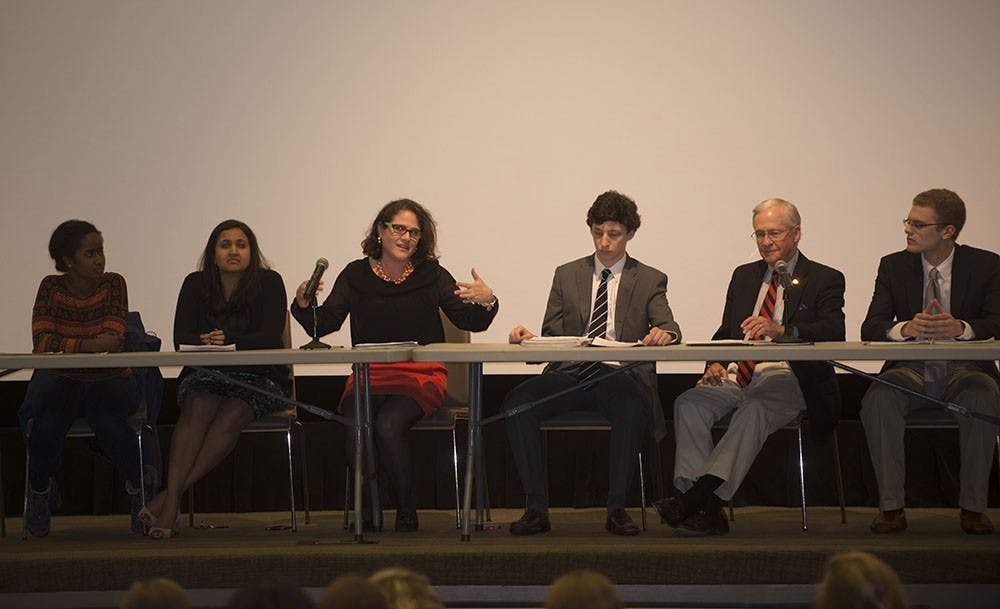Take Back the Night presented a mock trial of the Sexual Misconduct Board in Newcomb Theater Tuesday night as part of a week-long series of events aimed to raise awareness and encourage dialogue about sexual assault at the University.
The proceeding began with Associate Dean of Students Nicole Eramo, who chairs the Sexual Misconduct Board, outlining the process of reporting and prosecuting sexual assault.
“My first consideration is really going to be their [the victims’] health and safety — have they been checked out [at] the hospital, do they need to be checked out at student health,” Eramo said.
She went on to outline the steps that can be taken after an assault, such as academic support, the issuing of no-contact directives and reporting the perpetrator.
The student may choose to report the act to the police or to Dean of Students Allen Groves, the Title IX deputy coordinator at the University. He then passes it to investigators who construct a narrative of the incident, until the case is finally forwarded to the Board to be read. The Board has primary jurisdiction over sexual misconduct cases in violation of standard one of the 12 standards of conduct as outlined by the University Judiciary Committee.
“‘Effective consent’ means words or actions that show a knowing and voluntary agreement to engage in mutually agreed-upon sexual activity,” Eramo said in her opening remarks of the trial. “‘Sexual misconduct’ is a broad term encompassing sexual exploitation, harassment, non-consensual sexual contact and non-consensual sexual intercourse. Misconduct can occur between strangers and acquaintances including people involved in an intimate or sexual relationship. Misconduct can be committed by either sex.”
Eramo and volunteers re-enacted a scene from a sexual misconduct trial, in the hopes of lending transparency to the often confusing and mysterious process.
The mock trial featured a Mr. Rob Hicks, pre-med second-year, accused of raping first-year Ms. Cindy Elliot. Elliot and Hicks were in the same Chemistry lab and interested in getting to know each other. At a party on 14th street, both parties consumed alcohol to the point of intoxication, and then Hicks walked Elliot back to her dorm.
In a sexual misconduct trial, the complainant and the accused are first each asked to give opening remarks before fielding questions from members of the panel — which includes faculty, staff and students. The two individuals can also, indirectly through the chair of the panel, ask questions of each other.
In their testimonies, Elliot said she blacked out and could not remember much of the night. She said Hicks had raped her even after she expressed her desire for him to stop. Hicks claimed that Elliot facilitated the act and it was consensual.
Later, after questioning the witnesses, the panel regrouped and formulates final questions for the accused or complainant. Each side has a turn to give a closing statement before everyone leaves and the panel deliberates the charges individually. When a verdict is reached, everyone is invited back into the room and the decision is read. The Board offers a written explanation of the case within 10 days and the verdict or sanction or both can be appealed to the judicial body.
After the mock trial, the floor was opened for a question and answer session with the audience and a Sexual Misconduct Board panel.
The question and answer panel consisted of Student Council President Jalen Ross, Chair of the Honor Committee Nicholas Hine, Chair of the University Judiciary Committee Timothy Kimble, member of the Sexual Misconduct Board Shraddha Prasad, Director of Sexual and Domestic Violence Services at the Women’s Center Claire Kaplan, co-President of OneLess Staige Davis, and Vice President of One in Four Will Cadigan.
Many student said the system lacks severe sanctions, as expulsion is rarely, if ever, implemented in cases of sexual assault. Some students expressed concern that one can be expelled for plagiarism, but not necessarily for violating another person. Though the Honor Committee does not handle cases of sexual assault, in part because the Committee requires a higher standard of evidence than federal law allows in sexual misconduct board hearings, Hine said the Committee has found other ways to show support by advocating prevention and bystander intervention.
“Honor fosters a community of trust based on mutual respect and integrity,” Hine said. “Every year students are expelled for academic dishonesty, but very rarely has a student been expelled for sexual misconduct.”
Ross spoke to Student Council’s activism, including the recent passage of a resolution identifying seven changes to the sexual misconduct policy.







